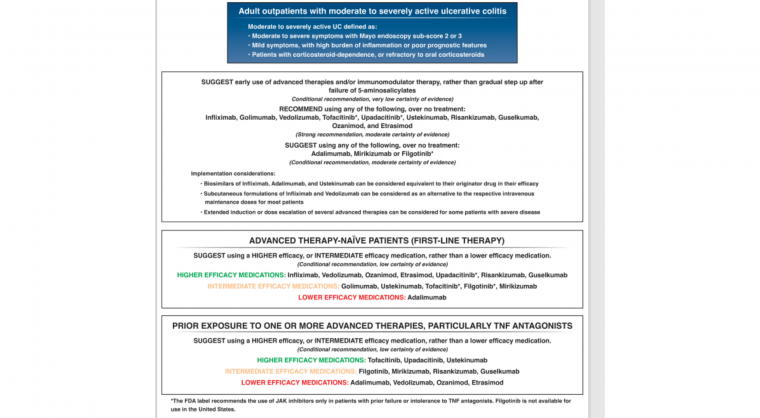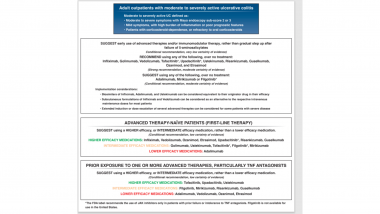Bethesda, MD (Nov. 19, 2024) — The American Gastroenterological Association (AGA) has released a new clinical guideline on the pharmacological management of moderate-to-severe ulcerative colitis, published today in Gastroenterology. This guideline groups the 12 currently available advanced treatments based on efficacy, to simplify the decision-making process for gastroenterologists and the approximately 1.25 million patients in the U.S. living with ulcerative colitis.
“Since the first biologic treatment for ulcerative colitis was introduced in 2005, 11 advanced therapies have become available in the U.S.,” said guideline author Ashwin N. Ananthakrishnan. “AGA’s updated guidelines integrate both tried-and-true treatments and the latest advancements, offering patients and providers the most current recommendations for managing moderate-to-severe ulcerative colitis.”
To streamline treatment selection, AGA categorized drugs with similar efficacy into “efficacy buckets” that allow clinicians to consider a range of effective treatments based on the likelihood of inducing remission, regardless of the drug’s mechanism. Comparative efficacy recommendations in the guideline are based on a separate, stand-alone systematic review and network meta-analysis (Comparative Efficacy of Advanced Therapies for Management of Moderate-to-Severe Ulcerative Colitis: 2024 American Gastroenterological Association Evidence Synthesis – Gastroenterology) of published evidence. Using this rigorous process resulted in practical, trustworthy guidance to help patients and clinicians evaluate multiple factors to tailor care, rather than selecting a single “best” treatment.
Key factors influencing treatment decisions include a patient’s risk of disease complications, disease severity, and other considerations such as comorbidities, age, safety risks, and pregnancy status. Additionally, prior treatment history can impact the effectiveness of subsequent therapies, underscoring the importance of personalized treatment planning.
Treatment recommendations:
- AGA recommends patients with moderate-to-severe ulcerative colitis start with advanced therapies and/or immunomodulators over a step-up approach following 5-aminosalicylates (5-ASA) failure.
- For patients who have not previously received advanced therapies, the medications with the highest efficacy include infliximab, vedolizumab, ozanimod, etrasimod, upadacitinib, risankizumab and guselkumab.
- Among patients with prior exposure to advanced therapies, particularly those who have experienced TNF antagonist failure, the medications with the highest efficacy are tofacitinib, upadacitinib, and ustekinumab.
As a living guideline, semiannual reviews of this body of evidence will be conducted by the authors, and recommendations will be updated when indicated.
Guideline: https://www.gastrojournal.org/article/S0016-5085(24)05563-X/fulltext
Understanding ulcerative colitis
There are two main types of inflammatory bowel disease (IBD) — ulcerative colitis and Crohn’s disease. Ulcerative colitis causes inflammation (swelling) and sores (called ulcers) in the large intestine (colon and rectum) and may affect part or all of the large intestine. Ulcerative colitis can happen at any age, but it is more likely to develop in people between the ages of 15 and 40. While there is no cure for ulcerative colitis, there are many options to help treat it, and the medications described in this AGA guideline can lead to remission (periods of no symptoms). Learn more about ulcerative colitis in the AGA GI Patient Center.
###
AGA Media Contact: Annie Mehl, Communications and Media Relations Manager, [email protected], 301-327-0013
About the AGA Institute
The American Gastroenterological Association is the trusted voice of the GI community. Founded in 1897, the AGA has grown to more than 16,000 members from around the globe who are involved in all aspects of the science, practice and advancement of gastroenterology. The AGA Institute administers the practice, research and educational programs of the organization. www.gastro.org
AGA is on Instagram.
Like AGA on Facebook.
Follow us on X @AmerGastroAssn
Check out our videos on YouTube.
Join AGA on LinkedIn.
About Gastroenterology
Gastroenterology is the most prominent journal in the field of gastrointestinal disease. As the official journal of the AGA Institute, Gastroenterology delivers up-to-date and authoritative coverage of both basic and clinical gastroenterology. Regular features include articles by leading authorities and reports on the latest treatments for diseases. Original research is organized by clinical and basic-translational content, as well as by alimentary tract, liver, pancreas, and biliary content. www.gastrojournal.org/














